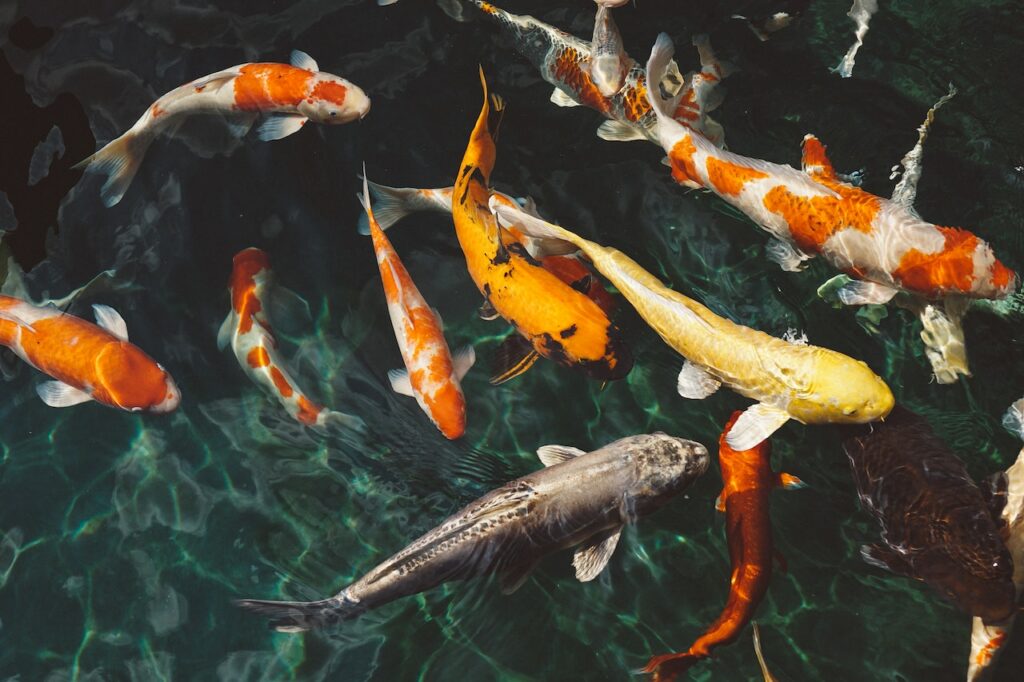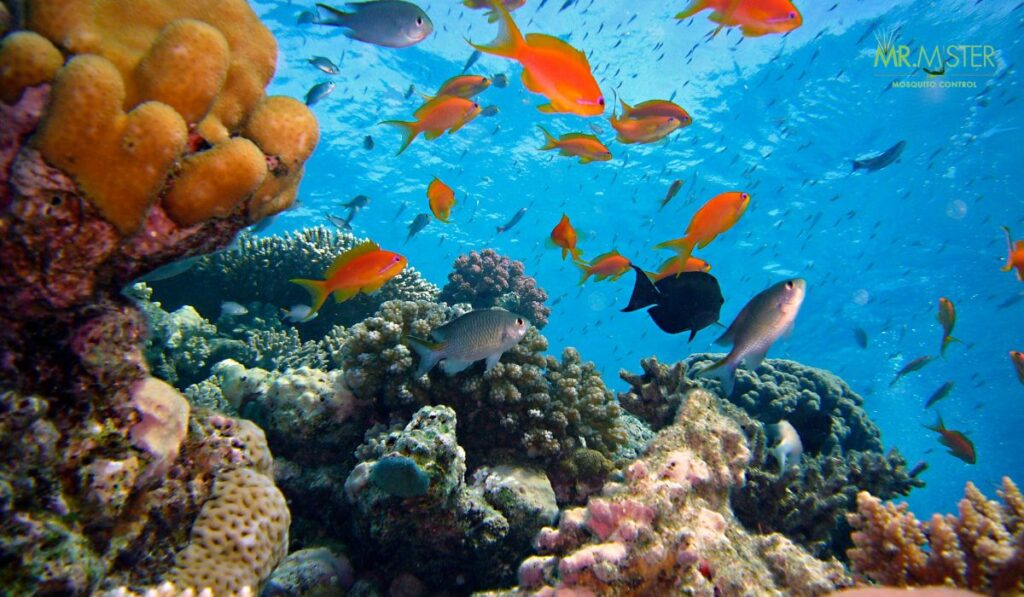Fish For Mosquito Control – Easy Way To Cast Them Away!
Summer is a time for BBQs, pool parties, and lazy afternoons spent basking in the sun. Unfortunately, it’s also prime time for everyone’s least favorite party guest: mosquitoes. These pesky insects can ruin even the most well-planned outdoor gathering, leaving you and your guests swatting and scratching all night long.
But fear not! There’s a solution that doesn’t involve dousing yourself in toxic bug spray or building a giant bug zapper. It’s called fish, and it’s the secret weapon of mosquito control.
That’s right, fish. As it turns out, certain species of fish are natural predators of mosquito larvae, which means they can help keep your outdoor spaces mosquito-free without the use of harmful chemicals. So if you’re tired of sharing your backyard with these blood-sucking pests, it’s time to reel in the benefits of fish for mosquito control.
How Can Fish Protect Against Zika Virus?
Fish can be an effective tool in the fight against the Zika virus, which is transmitted by infected Aedes mosquitoes. While there is no cure for Zika, preventing mosquito bites and controlling mosquito populations are key strategies for reducing the spread of the virus.
One way fish can help in the fight against Zika is by eating mosquito larvae. Some species of fish, such as gambusia (also known as mosquitofish), feed on mosquito larvae as part of their natural diet. By introducing these fish into bodies of water where mosquitoes breed, such as ponds, lakes, and even small containers like birdbaths, the fish can help to reduce the mosquito population by consuming their offspring before they have a chance to mature and spread the virus.
In addition, fish can also help to prevent the spread of Zika by reducing the number of adult mosquitoes. Studies have shown that introducing fish into mosquito breeding areas can lead to a significant reduction in the number of adult mosquitoes present, as the fish consume not only the larvae but also the pupae and emerging adults.
Overall, while fish alone cannot completely eliminate the risk of Zika transmission, they can be a valuable part of a larger mosquito control strategy that includes measures such as removing standing water and using insect repellent to prevent mosquito bites.
Benefits of Mosquitofish
Mosquitofish, also known as gambusia, are a type of fish that have become popular for their ability to control mosquito populations in outdoor spaces. Here are some of the benefits of using mosquitofish for mosquito control:
Natural and Chemical-Free
Mosquitofish are a natural way to control mosquitoes without the use of harmful chemicals or pesticides. This makes them a safe option for use in areas where people, pets, and other wildlife may be present.
Effective Predators
Mosquitofish are known for their voracious appetite for mosquito larvae, which is a key reason why they are so effective at controlling mosquito populations. In fact, one adult mosquitofish can eat up to 100 mosquito larvae in a single day.
Easy to Care For
Mosquitofish are hardy and easy to care for, making them a low-maintenance option for mosquito control. They can be added to most bodies of water, including ponds, lakes, and even small containers like birdbaths.
Cost-Effective
Compared to other mosquito control methods, such as regular spraying of pesticides or installation of expensive mosquito traps, mosquitofish are a relatively inexpensive option. Once introduced to a body of water, they can continue to provide mosquito control for years to come.
Environmentally Friendly
Mosquitofish are a sustainable and environmentally friendly option for mosquito control. They do not produce any harmful byproducts or contribute to pollution, making them a responsible choice for anyone looking to minimize their environmental impact.
Overall, mosquitofish are a safe, effective, and affordable way to control mosquito populations and reduce the risk of mosquito-borne diseases like West Nile virus and Zika virus.
There are several types of fish that can be used for mosquito control, including:
- Mosquitofish (Gambusia affinis)
- Fathead minnows (Pimephales promelas)
- Bluegill (Lepomis macrochirus)
- Koi (Cyprinus carpio)
- Goldfish (Carassius auratus)
Mosquitofish are the most commonly used fish for mosquito control due to their small size, aggressive appetite for mosquito larvae, and ability to thrive in a variety of environments.
Where Can You Find Mosquito-Eating Fish?
You can find mosquito-eating fish at various pet stores, garden centers, and online retailers.
Residents can take advantage of free or low-cost distribution of mosquito-eating fish, often provided by local mosquito control agencies or health departments as part of their comprehensive mosquito control programs.
Setting Up A Pond Or Tank For Mosquito Control
To set up a pond or tank for mosquito control, you will need a suitable body of water and the appropriate type and number of fish. Here are some steps:
Choose a suitable location
Look for a location with some shade and protection from wind to help keep the water cooler and prevent evaporation. Make sure the location is also free of any potential sources of pollution.
Choose the right type and number of fish
Consult with a local expert or retailer to determine the best type and number of fish for your particular situation. As a general rule, 1-2 fish per square foot of water surface area is a good starting point.
Set up the pond or tank
Fill the pond or tank with clean, fresh water and add any necessary filtration or aeration equipment to keep the water clean and oxygenated.
Add the fish
Gradually introduce the fish to their new environment over a span of several days after setting up the pond or tank. Enabling them to acclimate smoothly..
Maintain the pond or tank
To ensure the well-being of the fish and the efficiency of mosquito control, it is important to consistently monitor water quality and temperature. Additionally, conduct regular maintenance tasks like water changes and equipment cleaning as needed.
Conclusion
Incorporating fish for mosquito control into your outdoor spaces not only adds a natural and dynamic element but also offers an effective and eco-friendly solution to the perennial mosquito problem. By embracing these aquatic allies, you can create a harmonious environment that promotes both human and environmental well-being.
FAQs
What fish eat the most mosquitoes?
Certain fish, like the mosquitofish (Gambusia affinis), are known for their voracious appetite for mosquito larvae, making them excellent natural mosquito controllers.
Should I put mosquito fish in my pond?
Absolutely! Introducing mosquito fish to your pond can help reduce mosquito populations and the potential for mosquito-borne diseases.
Do fish help with mosquitoes?
Yes, they do. Fish that feed on mosquito larvae play a vital role in reducing mosquito populations and their impact on human health.
How many mosquito fish do I need for my pond?
The number of mosquito fish needed depends on the size of your pond and the existing mosquito population. A general guideline is about 1-2 fish per square meter of water surface.
How many mosquito fish do I need?
The quantity of mosquito fish required depends on the size of your water feature and the level of mosquito infestation. Consult with local experts for precise recommendations.
What is the lifespan of mosquito fish?
Mosquito fish typically live for 1 to 3 years, but their lifespan can vary based on environmental conditions and care.
What can I add to my pond to combat mosquitoes?
In addition to mosquito fish, you can add aquatic plants like water lilies and maintain proper water circulation to discourage mosquito breeding.
How do I permanently keep mosquitoes away?
While complete eradication is challenging, using mosquito-eating fish, removing stagnant water, and utilizing mosquito repellents can help manage mosquito populations effectively.
How do you keep mosquitoes away forever?
To maintain long-term mosquito control, consistently apply preventive measures such as using fish, eliminating standing water, and employing physical barriers like screens.
What fish will eat mosquito fish?
Predatory fish like largemouth bass might consume mosquito fish, so it’s best to keep them in separate environments.
Where do you put a mosquito fish?
You can place mosquito fish in ponds, water gardens, ornamental pools, and other aquatic environments with mosquito larvae.
Are mosquitofish easy to keep?
Yes, mosquitofish are relatively easy to care for. They require minimal maintenance and can thrive in various water conditions.
What kills mosquitoes the best naturally?
Mosquito-eating fish, citronella plants, neem oil, and essential oils like lavender and eucalyptus are some natural options to deter mosquitoes.
Will my goldfish eat my mosquito fish?
Goldfish are not natural predators of mosquito fish, so they are unlikely to target them as a food source.
Are mosquitofish invasive?
In some regions, mosquitofish have been considered invasive due to their ability to outcompete native species. Consult local authorities before introducing them to new environments.
How big will mosquitofish get?
Mosquitofish typically reach a length of 2 to 2.5 inches, with females being slightly larger than males.
* Schedule a Free Mosquito Control Consultation – 404-941-0720 *
* Guaranteed Results * 100% Biodegradable * Locally Owned







